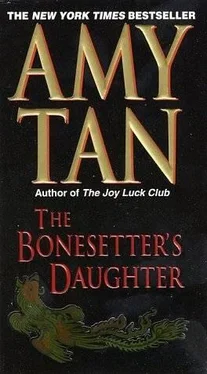She turned on her computer and felt drained before she even started. What was she doing ten years ago? The same thing. What would she be doing ten years from now? The same thing. Even the subjects of the books she helped write were not that different, only the buzzwords had changed. She took a deep breath and phoned the new client, Ted. His book, Internet Spirituality, was about the ethics created by cosmic computer connections, a topic he felt sure was hot right now but would lose its cachet if the publisher didn't get it to market as soon as possible. He had said so in several urgent phone messages he had left over the weekend when Ruth was in Tahoe.
"I have nothing to do with arranging publishing dates," Ruth now tried to explain.
"Stop thinking in terms of constraints," he told her. "If you write this book with me, you have to believe in its principles. Anything is possible, as long as it's for the good of the world. Make the exception. Live exceptionally. And if you can't do that, maybe we should consider whether you're right for this project. Think about it, then let's talk tomorrow."
Ruth hung up. She thought about it. The good of the world, she muttered to herself, was her agent's job. She would warn Gideon that the client was pushy and might try to change the publication date. She would stand firm this time. To do what the client wanted while meeting her other commitments would require her to work 'round the clock. Fifteen years earlier she could have done that-in the days when she also smoked cigarettes and equated busyness with feeling wanted. Not now. Untense the muscles, she reminded herself. She took another deep breath and exhaled as she stared at the shelves of books she had helped edit and write.
The Cult of Personal Freedom. The Cult of Compassion. The Cult of Envy.
The Biology of Sexual Attraction. The Physics of Human Nature. The Geography of the Soul.
The Yin and Yang of Being Single. The Yin and Yang of Being Married. The Yin and Yang of Being Divorced.
The most popular books were Defeat Depression with Dogs, Procrastinate to Your Advantage, and To Hell with Guilt. The last book had become a controversial bestseller. It had even been translated into German and Hebrew.
In the coauthoring trade, "Ruth Young" was the small-type name that followed "with," that is, if it appeared at all. After fifteen years, she had nearly thirty-five books to her credit. Most of her early work had come from corporate communications clients. Her expertise had woven its way into communication in general, then communication problems, behavioral patterns, emotional problems, mind-body connections, and spiritual awakening. She had been in the business long enough to see the terms evolve from "chakras" to "ch'i," "prana," "vital energy," "life force," "biomagnetic force," "bioenergy fields," and finally back to "chakras." In bookstores, most of her clients' words of wisdom were placed in the light or popular sections-Self-Help, Wellness, Inspirational, New Age. She wished she were working on books that would be categorized as Philosophy, Science, Medicine.
By and large, the books she helped write were interesting, she often reminded herself, and if not, it was her job to make them interesting. And though she might pooh-pooh her own work just to be modest, it irked her when others did not take her seriously. Even Art did not seem to recognize how difficult her job was. But that was partly her fault. She preferred to make it look easy. She would rather that others discern for themselves what an incredible job she did in spinning gold out of dross. They never did, of course. They didn't know how hard it was to be diplomatic, to excavate lively prose from incoherent musings. She had to assure clients that her straightforward recasting of their words still made them sound articulate, intelligent, and important. She had to be sensitive to the fact the authors saw their books as symbolic forms of immortality, believing that their words on the printed page would last far longer than their physical bodies. And when the books were published, Ruth had to sit back quietly at parties while the clients took the credit for being brilliant. She often claimed she did not need to be acknowledged to feel satisfied, but that was not exactly true. She wanted some recognition, and not like the kind she had received two weeks before, at the party for her mother's seventy-seventh birthday.
Auntie Gal and Uncle Edmund had brought along a friend from Portland, an older woman with thick glasses, who asked Ruth what she did for a living. "I'm a book collaborator," she answered.
"Why you say that?" LuLing scolded. "Sound bad, like you traitor and spy."
Auntie Gal then said with great authority, "She's a ghostwriter, one of the best there is. You know those books that say 'as told to' on the cover? That's what Ruth does-people tell her stories and she writes them down, word for word, exactly as told." Ruth had no time to correct her.
"Like court stenographers," the woman said. "I hear they have to be very fast and accurate. Did you go through special training?"
Before Ruth could answer, Auntie Gal chirped: "Ruthie, you should tell my story! Very exciting, plus all true. But I don't know if you can keep up. I'm a pretty fast talker!"
Now LuLing jumped in: "Not just type, lots work!" And Ruth was grateful for this unexpected defense, until her mother added, "She correct spelling too!"
Ruth looked up from her notes on her phone conference with the Internet Spirituality author and reminded herself of all the ways she was lucky. She worked at home, was paid decent money, and at least the publishers appreciated her, as did the publicists, who called her for talking points when booking radio interviews for the authors. She was always busy, unlike some freelance writers who fretted over the trickle of jobs in the pipeline.
"So busy, so success," her mother had said recently when Ruth told her she didn't have any free time to see her. "Not free," LuLing added, "because every minute must charge money. What I should pay you, five dollar, ten dollar, then you come see me?" The truth was, Ruth did not have much free time, not in her opinion. Free time was the most precious time, when you should be doing what you loved, or at least slowing down enough to remember what made your life worthwhile and happy. Her free time was usually usurped by what seemed at the time urgent and later unnecessary. Wendy said the same thing: "Free time doesn't exist anymore. It has to be scheduled with a dollar amount attached to it. You're under this constant pressure to get your money's worth out of rest, relaxation, and restaurants that are hard to get into." After hearing that, Ruth didn't agonize as much over time constraints. It wasn't her fault she didn't have enough time to do what was necessary. The problem was universal. But try explaining that to her mother.
She pulled out her notes for chapter seven of Agapi Agnos's latest book, Righting the Wronged Child, and punched Agapi's number. Ruth was one of the few people who knew that Agapi's real name was Doris DeMatteo, that she had chosen her pseudonym because agapi meant "love" and agnos referred to ignorance, which she redefined as a form of innocence. That was how she signed her books, "Love Innocence, Agapi Agnos." Ruth enjoyed working with her. Though Agapi was a psychiatrist, she didn't come across as intimidating. She knew that much of her appeal was her Zsa Zsa Gabor shtick, her accent, the flirtatious yet intelligent personality she exuded when she answered questions in TV and radio interviews.
During their phone meeting, Ruth reviewed the chapter that presented the Five Don'ts and Ten Do's of becoming a more engaged parent.
Читать дальше












